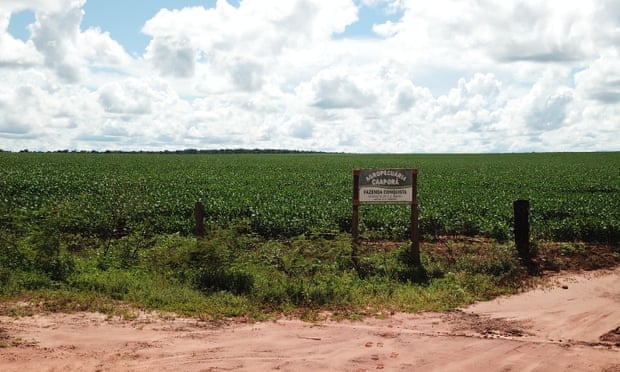June 19, 2025 | 04:12 GMT +7
June 19, 2025 | 04:12 GMT +7
Hotline: 0913.378.918
June 19, 2025 | 04:12 GMT +7
Hotline: 0913.378.918

An investigation uncovered Cargill’s links with the Brazilian supplier farm Fazenda Conquista. Photo: Greenpeace Unearthed/Pedro Ladeira
A major supplier of animal feed is still buying soya and corn from a farm linked to deforestation in the Amazon, despite having pledged to clean up its global supply chains.
Cargill, a giant agricultural multinational that sells feed to British chicken farms, buys crops from a farm growing soybeans on deforested land in the Brazilian Amazon.
An investigation by the Bureau of Investigative Journalism, Greenpeace Unearthed, Repórter Brasil and Ecostorm uncovered Cargill’s links with the Brazilian supplier farm, Fazenda Conquista.
The farm in the Brazilian Amazon was responsible for eight sq km of deforestation since 2013, with multiple forest fires recorded in 2020. Its trading with Cargill includes supplying soya, and the farm has signed a deal to deliver 5,700 tonnes of corn to the company this year. It is not known whether the crops in question were grown on a recently deforested part of the farm.
The findings raise questions about Cargill’s due diligence process. The company has pledged not to buy soya beans from land deforested in the Amazon after 2008, and last year committed to moving faster to eliminate “commodity-driven deforestation”.
But Cargill has also been repeatedly linked to deforestation. In 2020, the Bureau and Unearthed reported 800 sq km of deforestation and 12,000 fires since 2015 on land used by Cargill soya suppliers in the Cerrado, another protected biome in Brazil.
The company exports thousands of tonnes of Brazilian soya to the UK each year for use in animal feed. Campaigners said the findings highlighted the hidden environmental costs of cheap meat.
“Meat chickens are the most intensively farmed animals in the UK with over a billion slaughtered each year,” Lindsay Duncan, the campaigns manager at World Animal Protection UK, said.
“The growing demand for cheap chicken leads to the growing demand for soy, causing large-scale deforestation and devastating environmental degradation, which destroys the natural habitats of millions of wild animals.”
As much as 80% of all soya grown across the world is fed to livestock. The UK imported about 3.5m tonnes of soya beans in 2019, with roughly half of that ending up in chicken feed.
About a quarter of the UK’s imported soya comes from Brazil, and the vast majority of that is traded by Cargill.
Cargill said: “We are committed to eliminating deforestation from our supply chains in the shortest possible time, and we are accelerating our efforts.” Responding to the findings about Fazenda Conquista, the statement continued: “If fire has been used and has impacted the native forest or any irregularity is confirmed, we will take the appropriate measures.”
The state of the land in question before 2013 is disputed: Fazenda Conquista’s management said in a statement that the farm had permission from the local environmental agency to carry out a “controlled burn” on the land because it had originally been deforested in the early 1980s.
However, satellite imagery shows that the forest had been regrowing since then, and Brazil’s deforestation monitoring programme flagged the clearing in 2013 as deforestation.
The local environment agency, Sema, confirmed it had authorised a burn on the farm in 2012 to clear pasture with some degree of regeneration. But the agency said no licences for full deforestation inside the farm had been authorised, and admitted that although it had lacked high-resolution satellite imagery prior to 2019 to identify real-time deforestation, a recent analysis suggested there had been deforestation within the property. Sema said it would investigate further.
In an independent analysis of satellite imagery, the NGO Aidenvironment also deemed the land to have been deforested. This year the farm will be blacklisted under the Soy Moratorium, a voluntary industry agreement that bars the trade in soya beans on Amazon land deforested after 2008. The Working Group for Soya, which oversees the moratorium, said it had identified an area of deforestation that had been sown with soya in the last planting season.
A reporter from the Bureau visited the farm this year and saw soya beans growing on the land.
Destruction of the Amazon rainforest has serious consequences for the climate, with experts fearing the biome might soon cross a “tipping point” at which it begins to shift from lush rainforest into a drier savannah, releasing large quantities of stored carbon into the atmosphere.
According to Brazil’s space agency, Amazon deforestation soared 22% over the 12 months to July last year.
Major British food companies have adopted “zero deforestation” certification schemes to tackle the problem but “dirty” soya linked to deforestation continues to enter supply chains.
(The Guardian)

(VAN) Extensive licensing requirements raise concerns about intellectual property theft.

(VAN) As of Friday, a salmonella outbreak linked to a California egg producer had sickened at least 79 people. Of the infected people, 21 hospitalizations were reported, U.S. health officials said.

(VAN) With the war ongoing, many Ukrainian farmers and rural farming families face limited access to their land due to mines and lack the financial resources to purchase needed agricultural inputs.

(VAN) Vikas Rambal has quietly built a $5 billion business empire in manufacturing, property and solar, and catapulted onto the Rich List.

(VAN) Available cropland now at less than five percent, according to latest geospatial assessment from FAO and UNOSAT.

(VAN) Alt Carbon has raised $12 million in a seed round as it plans to scale its carbon dioxide removal work in the South Asian nation.

(VAN) Attempts to bring down the price of the Japanese staple have had little effect amid a cost-of-living crisis.